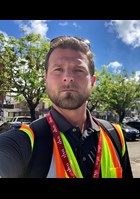Meet Our Team
We sat down and talked to some of our most successful inspectors to see what it takes to become one of the best. Here’s what they had to say!
Thad White
Task Order Coordinator
Johnny Saulsberry
Task Order Coordinator
Dahiana Rosario Quinones
Inspector 91501

What did you do before you became an inspector?
I was working in the service industry for 12 years.
When did you become an inspector?
In 2015 I attended training with [WSP field staff members] Jon Richards and Neil Swenson.
What or who introduced you to this business?
I had a co-worker who was an inspector with WSP who encouraged me to apply.
How would you describe the inspector position?
As an inspector, you will be among the first group of people that will provide hope to an applicant after a disaster. You have the satisfaction that while performing your job, you are helping in the journey of an applicant to get their life back to normal. You aim to help as many applicants as you can daily.
Although you are alone on the road all day, the support you receive from WSP staff makes you feel confident about your inspections. I always got back home after a deployment with the satisfaction that I contributed to a better future for the applicants.
What is your current role?
My current role is Task Order Coordinator which means I support inspectors in the field throughout their deployment. When we are not deployed to a disaster, I develop the tools and training to help inspectors thrive. I am also the office’s Inclusion and Diversity representative.
"As an inspector, you will be among the first group of people that will provide hope to an applicant after a disaster."
What disaster event was your first deployment?
My first disaster was flooding in East Baton Rouge, Louisiana in 2016.
What were the greatest challenges on your first deployment and how did you overcome these challenges?
Because it was my first deployment and the water had already receded when we began our inspections, the greatest challenge was to learn what evidence to look for to determine if a home had been damaged by flood. Once I learned what to look for from the training materials and other experienced inspectors, I was able to identify damages more accurately and efficiently.
Was there a memorable event on this deployment?
I remember arriving at an inspection where the driveway was completely covered in puddles. When I walked around the puddles into a wooded area, I found banana spiders and snakes! Luckily, I haven’t seen any more snakes or banana spiders since then.
Did you have a mentor?
Yes, my co-worker who recruited me helped me so much in the beginning.
What advice would you give to encourage a new inspector?
When you are first starting out, don’t get discouraged! Being an inspector seems difficult in the beginning, but it quickly gets much easier! WSP will support you to make sure you succeed.
Joseph Piel
Inspector 60746

What did you do before you became an inspector?
Before becoming an inspector, I lived many places, trying to find my way in life. I worked in construction, sold cell phones, did tax preparation, and worked as a bartender.
When did you become an inspector?
In 2008. I was 23 and fresh out of college when I got trained in Metairie, Louisiana by [current WSP Field Staff member] Dave Jackson.
What or who introduced you to this business?
My stepfather who has been an inspector since 1992.
How would you describe the inspector position?
Being an inspector is amazing. While WSP provides plenty of support in the form of inspection guidance, field managers, and dedicated office staff, they allow you to work independently and make your own schedule, which I find very appealing. The disaster survivors you meet are so incredibly grateful, it’s hard not to be overwhelmed by emotion at times. I’ve been called an angel, hugged, and cried upon more times than I can count. I am honored to serve my fellow citizens in their time of need.
"The disaster survivors you meet are so incredibly grateful, it’s hard not to be overwhelmed by emotion at times."
What is your current role?
My current role is Task Order Manager. I manage all aspects of disasters assigned to WSP from start to finish. When disaster activity is minimal, I develop, promote, and conducts preparedness and readiness training for inspectors.
What disaster event was your first deployment?
My first disaster was Hurricane Isaac in New Orleans.
What were the greatest challenges on your first deployment and how did you overcome these challenges?
My greatest challenge was figuring out how to do my first inspection! I had mastered the training but when it came time to do an inspection I froze up. Luckily, my stepdad was available to help me.
Did you have a mentor?
Yes, my stepdad, Ozzie Szunko. Without his guidance and mentorship, I would never be where I am today.
What advice would you give to encourage a new inspector?
Most importantly, develop relationships with other inspectors and take advantage of the resources available to you. WSP provides an extensive Inspector Library, Job Aids, and a broad array of tools to help you succeed.
Become an Inspector
As you can see, WSP inspectors come from all different backgrounds. A consistent theme in the inspectors' responses is the importance of mentorship and relationships with experienced inspectors.
To ensure that every inspector is given the best chance to succeed, WSP now provides Field Inspection Supervisors (FIS) to all new and novice inspectors! Our FIS team is composed of veteran inspectors who have succeeded throughout their careers and will share their knowledge and experience with you. In fact, an FIS will accompany you on your first inspection to demonstrate the inspection routine!
We hope that you will sign up to become an inspector today!
